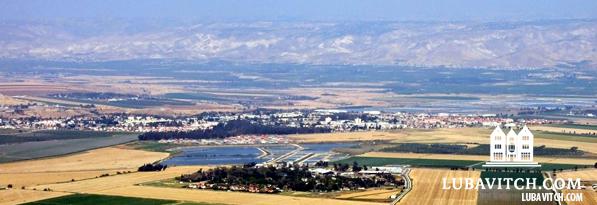(lubavitch.com) In Kibbutz Beit Alfa’s Children’s House, director Anat Lev is busy planning High Holiday activities with the local Chabad rabbi.
Religious activity was once verboten on this kibbutz, as on many others. Performing basic Jewish rituals, like kindling Shabbat candles, was not permitted in the communal dining hall, and rabbis were barred from entering the kibbutz. Today, thanks to a shifting trend toward more interest in and openness to religious expression, Kibbutz Beit Alfa owns a shofar. But there is nobody on-site who knows how to blow it.
Kibbutz communities, which account for just under 2% of Israel’s population, have largely gone the route of privatization, ending a decades-long commitment to socialist ideals. “Initially, everyone had the same things, earned the same amount of money, wore the same type of clothing. Now, we are individuals, now we are looking outward,” said Lev, for whom the shift in kibbutz life has opened up possibilities for religious involvement.
“I saw my first pair of tefillin after the army, and I learned that I did not know the simple basics of Judaism,” said Lev. “It is important for the children to know about their religion from the time they are young so that they know—whether they are secular or religious—that we are one nation.”
So she has welcomed Rabbi Royi Tor, Chabad’s representative in Amkavit She’an, the greater valley region surrounding Beit She’an, to teach her young charges about the High Holidays.
Tor is himself a product of the kibbutz movement, having been raised on the Reshafim kibbutz in Beit Shean. Established by the Marxist-Zionist Shomer Hatzair youth movement, made up, primarily, of refugees from Poland and Romania in 1947, Reshafim privatized its economy in the mid-90s. In 1998, the dining room stopped serving breakfast and supper and started selling lunch. In 2004, salaries were introduced and members started paying for expenses. Tor soon discovered Chabad, and was moved, after several years of Torah study, to share his inspiration with fellow kibbutzniks. For the last five years, Tor has taught Torah classes, created holiday programming for young children and led prayer services at 13 kibbutzim in the area.
“I don’t tell them do this, do that. I tell them that there is living Torah that’s there for them. Even if they are not observant, the Torah speaks to a person’s soul,” Tor said.
Dotan Korati grew up on Kfar Ruppin where he worked in the date palm grove. “The G-d of the kibbutzim is nature. You thank the field. You thank the plants for their bounty.” Korati, who studied with Rabbi Tor, is now a Chabad representative at Rishon Letzion College of Management. “The people who founded the kibbutz wanted to leave the religion, and the second generation knew nothing about Judaism. Now, we, the third generation want to know.”
Adina Levy hosts Rabbi Tor’s Kibbutz Beit HaShita Torah classes in her home. From the front yard of her ranch-style home, where a pomelo citrus tree perfumes the air, one can see Mount Gilboa. During the weekly classes, 15 friends and participants from neighboring kibbutzim gather to hear how the weekly Torah portion relates to modern life. “People here do not know Torah and we were thirsty, we want to open our minds,” said Levy.
Levy was born to an Orthodox family of twelve children in Jerusalem. Her brothers split from the family, and Levy followed them to Kibbutz HaShita at age 15, where she lived in the children’s home. “The kibbutz is my Eden. Where else would you look and see so many shades of green, hear the birds sing, and live next to the fields of David, Jonathan and King Saul?”
Her one regret is allowing her children to grow up in the kibbutz’s children’s home. “It wasn’t natural. It saddens me that my children did not stay with me. Maybe because of this I am interested in returning to my roots, to my family‘s ways.”
Three of Levy’s five children have adopted a more observant lifestyle. They are part of a micro trend in which the children of secular kibbutzim are embracing religious practice, while the kibbutzim at large are becoming more open to Jewish study and observance.
Seven years ago, Kibbutz Nachshonim, in central Israel, put an end to its annual Yom Kippur barbecue. Instead, each year the kibbutz invites a guest rabbi to lead services on the Day of Atonement. “Kibbutzniks who become more religious are a statistic. Every kibbutz that I know in Israel has at least one,” said Korati.
Change is not without opposition. Three years ago, Beit Alfa’s dining hall stopped serving dinner on Yom Kippur, which “caused an uproar,” according to Lev. Although kibbutz life is no longer purely socialist, the tradition of collective decision making remains strong. “People are afraid that if their neighbor stops driving on Shabbat, then they will be coerced into keeping the streets quiet on Shabbat. One person’s decision affects the other.”
At Beit HaShita, when Levy invited a neighbor to join High Holiday services he replied that he would be riding his motorcycle in front of the gathering place and rev the motor to drown out the prayers. “People think that if we start praying then we start a synagogue, and then people will no longer be free to do as they choose,” she said.
Korati recalls that his mother-in-law was, initially, adamantly opposed to his increasingly observant lifestyle. Eventually she asked Rabbi Tor to kosher her kitchen so that Korati and his wife would eat in her home. Though his mother-in-law is not observant, seeing Korati’s lifestyle up close has changed her attitude.
“She says Chabad is the closest to the kibbutz mindset. Chabad and the kibbutz view all people as equal, and both see the world not as it is, but how it is supposed to be.”

Be the first to write a comment.